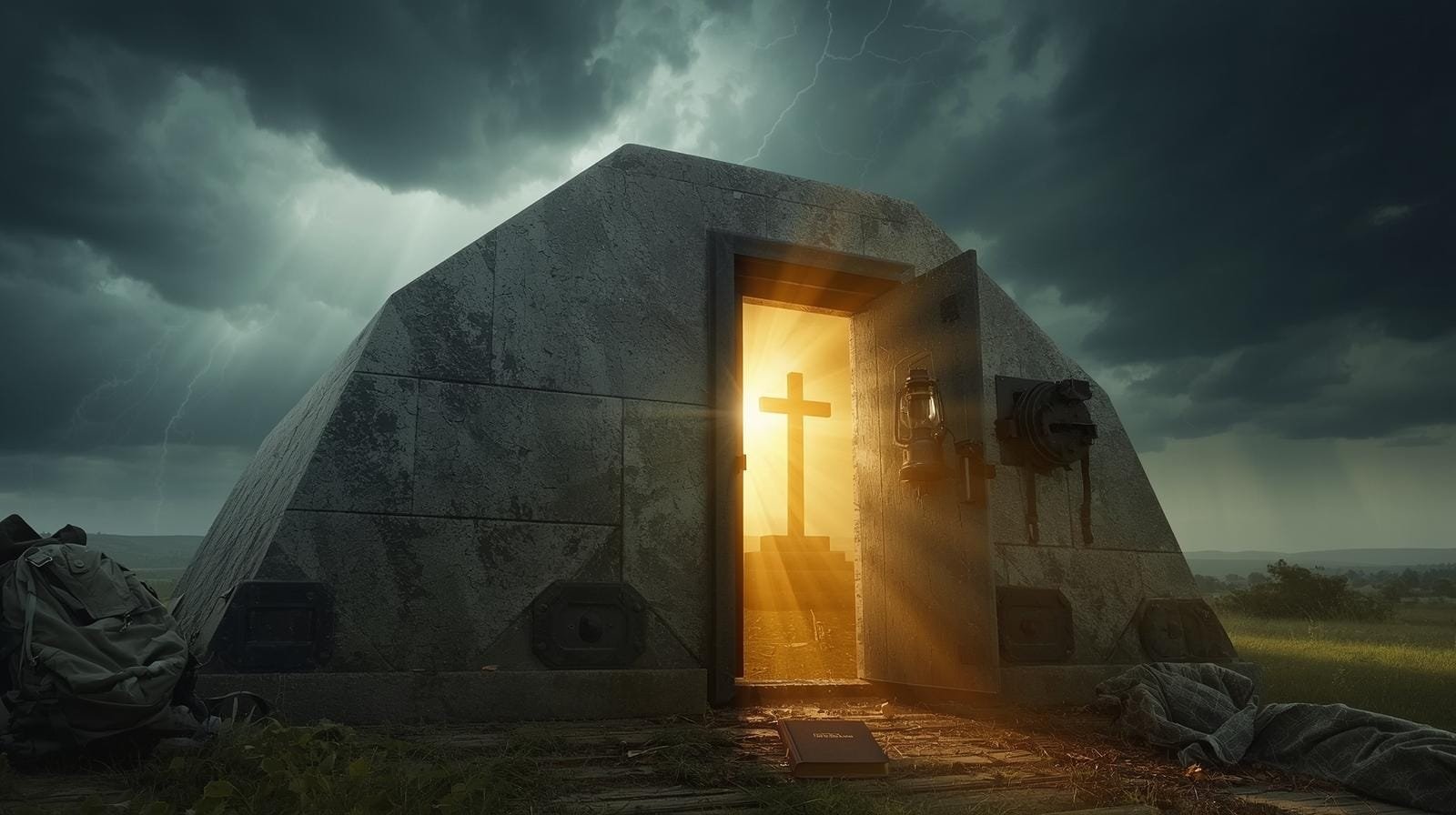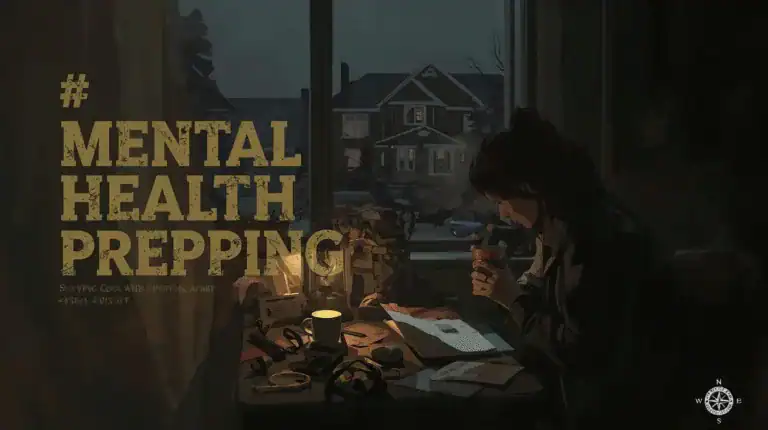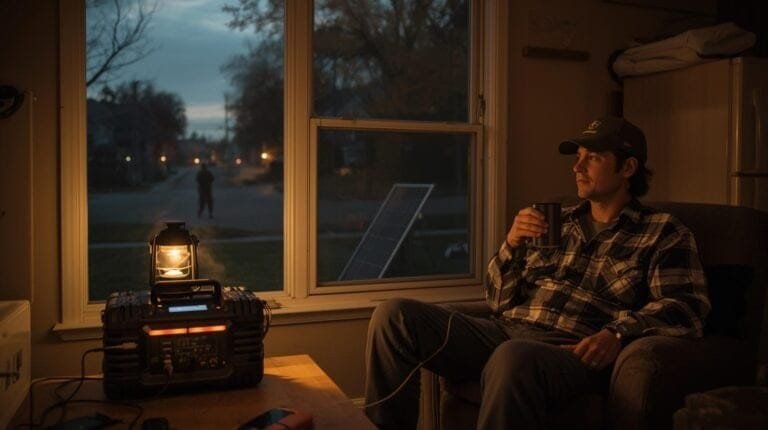
God Is Our Refuge: Building Spiritual Shelter Before the Storm
Your Prepper Bunker Isn’t Enough
Picture this: you’ve got your bug-out bag packed tighter than TSA’s worst nightmare, three months of freeze-dried chili stacked in the pantry, and even a backup solar rig humming quietly in the backyard. Your water filtration system could make pond scum taste like spring water, and your emergency radio picks up signals from three states over.
Feels good, right?
Until the storm outside isn’t just wind and rain—it’s doubt, fear, and despair creeping through cracks you never saw coming. Your gear is perfect, your plans are solid, but your soul feels like it’s standing naked in a hurricane.
Congratulations, you’ve built a fortress for your body but left your spirit shivering on the porch. What you really need is a spiritual shelter that can weather the storms gear can’t touch.
At Adventure Wiser, we believe true preparedness combines both physical and spiritual readiness.
Why Spiritual Shelter Matters More Than Cinder Blocks

Every prepper knows the golden rule: two is one, and one is none. Redundancy keeps you alive. But somehow we apply this logic to water filters and flashlights while ignoring the most critical backup system of all—spiritual preparedness.
Here’s what your gear can’t do:
- Batteries die. God’s strength doesn’t need charging.
- Food spoils. His Word never expires.
- Steel rusts. His promises don’t corrode.
- Plans fail. His sovereignty doesn’t have a Plan B because it never needed one.
Psalm 46:1 cuts straight to the point: “God is our refuge and strength, a very present help in trouble.” Not “will be” or “might be”—is. Present tense. Available now, not after you’ve exhausted every other option.
Think of it this way: you wouldn’t head into a blizzard without proper shelter, so why face life’s chaos without spiritual shelter?
Your physical preps protect your body for months or maybe years. Spiritual shelter protects your soul for eternity and gives you the strength to use everything else effectively.
What Spiritual Shelter Actually Looks Like
Forget the churchy fluff. Real spiritual shelter looks more like tactical planning than Sunday morning feelings. It’s about building systems that work when everything else fails.
For more practical guides on building both physical and spiritual preparedness, check out our complete resources at Adventure Wiser.
Daily Prayer: Your Sandbags Against the Flood

Just like sandbags channeled around your property before a flood, prayer creates boundaries around your mind and heart. It’s not about perfect words or fancy language—it’s about consistent communication with the One who controls the storm.
Make it practical:
- Start with 5 minutes every morning, same time, same place
- Keep it simple: “God, help me with today’s challenges”
- End each day reviewing what went right and what needs His help tomorrow
Scripture: Your Reinforced Walls
Your emergency kit probably has a hand-crank radio for when the power goes out. Scripture serves the same function—reliable communication when everything else goes dark. But unlike that radio, God’s Word doesn’t need batteries or clear weather.
Build your arsenal:
- Psalm 23 for when fear tries to set up camp in your head
- Philippians 4:19 for financial stress that keeps you awake at 3 AM
- Isaiah 41:10 for when you feel like you’re facing impossible odds alone
- Romans 8:28 for when life makes zero sense and you need perspective
Faith Community: Your Backup Generator
Lone wolves die alone. Even the most prepared survivalist needs people who’ve got their back. A solid faith community provides spiritual backup power when your personal reserves run low.
Find your tribe:
- Small group Bible study beats mega-church anonymity
- One prayer partner trumps a hundred Facebook friends
- Regular fellowship charges your spiritual batteries better than any solar panel
Worship: Your Stormproof Roof
Worship isn’t about singing nice songs—it’s about declaring truth louder than your circumstances can lie. When the storm is raging outside, praise keeps the rain of despair from flooding your heart.
Practical worship:
- Crank worship music while doing prep work
- Thank God for specific provisions (even your annoying neighbor who knows first aid)
- Praise Him for past storms you’ve already survived
How to Start Building Your Spiritual Refuge Today
Step 1: Clear Ground for Construction
Just like clearing brush before pitching a tent, you need to clear spiritual clutter that weakens your defenses. Unforgiveness, persistent worry, and unconfessed sin are like debris that prevents solid foundation work.
Clearing operations:
- Identify what you’re carrying that doesn’t belong to you (other people’s problems, past failures, future fears)
- Confession isn’t about groveling—it’s about unloading weight that slows you down
- Forgiveness isn’t about feelings—it’s about freeing yourself from carrying other people’s debts
Step 2: Lay a Strong Foundation
Every good foundation takes time to cure properly. Daily scripture reading and journaling work like concrete—they need consistency to develop strength. Skip days, and you get weak spots that crack under pressure.
Foundation protocol:
- Read one chapter daily (start with Psalms if you’re new to this)
- Write three things: what you read, what it means, how it applies today
- Keep it simple—fancy journals aren’t required, notebook paper works fine
Step 3: Raise the Frame
Community adds strength beams to your spiritual structure. Just like a house frame distributes weight across multiple supports, fellowship spreads life’s load across multiple people who can help carry it.
Frame construction:
- Join a small group or Bible study (online counts if geography limits you)
- Start a Worship Wednesday routine with family or friends
- Find an accountability partner who’ll ask hard questions about your spiritual prep status
Step 4: Weatherproof the Roof
Storms will come—that’s guaranteed. Worship and praise work like waterproof sealant, keeping leaks of fear and despair from dripping into your safe space when the pressure mounts.
Weather sealing:
- Develop a crisis worship playlist for emergency deployment
- Practice praising God for who He is, not just what He does
- Learn to worship through gritted teeth when you don’t feel like it
Step 5: Stock the Spiritual Shelter
Just as you stash food and water for physical survival, fill your heart with memorized scripture and worship songs. They’ll sustain you when external supplies—and inner peace—run low. Your spiritual shelter becomes your hidden reserve.
When the Storm Hits: Operating Procedures
Your physical preps have protocols for different scenarios. Spiritual preparedness needs the same systematic approach.
Code Yellow: Life Stress
- Increase prayer frequency to hourly check-ins
- Read Psalms for perspective and comfort
- Activate prayer network for backup support
- Maintain regular worship to prevent panic
Code Orange: Crisis Developing
- Daily extended prayer and Bible study
- Increase fellowship and community contact
- Review past journal entries of God’s faithfulness
- Focus worship on God’s sovereignty and control
Code Red: Full-Scale Emergency
- Continuous prayer and scripture meditation
- Immediate community mobilization
- Fall back on memorized verses when concentration fails
- Worship as an act of defiance against despair
Advanced Spiritual Preparedness
Scripture Memory Systems
Just like organizing your physical supplies, systematic scripture memory requires method:
- Weekly verses: One new verse every seven days
- Theme-based: Group verses by topic (fear, provision, strength)
- Progressive difficulty: Start with shorter verses, build to longer passages
- Regular review: Rotate through previously memorized verses
Spiritual OPSEC (Operational Security)
- Guard your inputs: Limit news and social media that feeds fear
- Protect prayer time: Treat it like any other critical daily operation
- Secure your community: Choose spiritual advisors who strengthen rather than drain
- Maintain readiness: Regular spiritual training, not just crisis response
Faith-Based Decision Making
Integrate spiritual discernment into prep decisions:
- Pray before major purchases or moves
- Seek biblical wisdom for family preparedness plans
- Consider how your preparations can serve others
- Balance trust in God with responsible preparation
Common Spiritual Preparedness Mistakes
- Mistake #1: The Foxhole Prayer
Only turning to God during emergencies makes about as much sense as only maintaining your generator during power outages. Spiritual strength requires regular training, not crisis conversions. - Mistake #2: The Prosperity Gospel Trap
Believing faith guarantees smooth sailing is like believing a first aid kit prevents injuries. God promises His presence in trouble, not immunity from it. - Mistake #3: The Lone Ranger Approach
Trying to go it alone spiritually is as dangerous as solo wilderness survival. Even the most self-sufficient prepper needs backup. - Mistake #4: All Faith, No Works
Spiritual preparation doesn’t replace physical preparation any more than physical preparation replaces spiritual preparation. Both matter.
Integration: Faith and Physical Preparedness
The goal isn’t choosing between spiritual and physical preparation—it’s integrating both into a comprehensive approach to uncertain times.
How they work together:
- Prayer guides prep decisions: Seek wisdom about what to prepare for and how
- Scripture shapes perspective: View preparation as stewardship, not paranoia
- Community multiplies resources: Share knowledge, supplies, and support
- Worship maintains sanity: Keep eternal perspective during temporal chaos
Biblical models of preparation:
- Joseph’s grain storage: Physical preparation guided by divine revelation
- Noah’s ark building: Following God’s specific preparation instructions
- David’s psalms: Spiritual preparation for physical dangers
- Jesus’ instructions: “Be wise as serpents, harmless as doves”

Personal Experience: When Gear Isn’t Enough
I’ve stacked ammo cans like Tetris blocks, tested water filters until my kitchen looked like a chemistry lab, and patched leaky tents while getting soaked in storms that had no business being that fierce. My bug-out bag has been refined more times than premium gasoline.
But the times I’ve been truly shaken—the moments that left me feeling unprepared and vulnerable—weren’t when I ran out of beans or batteries. They hit when I was running low on faith. This can hit you like a ton of bricks!
When job security evaporated faster than morning dew in August. When family health crises made all my carefully laid plans feel like kindergarten homework. When the weight of watching our culture implode left me questioning whether any amount of preparation could matter.
That’s when I learned the hard way: every prepper knows gear breaks, plans fail, and supplies run out. But when your spiritual shelter is built on the foundation of God’s character rather than your own competence, you’ve got something that doesn’t wear out, break down, or need replacement parts.
Psalm 91 cuts through all the noise: “He is my refuge and my fortress, my God, in whom I trust.” Not your bunker, not your supplies, not your plans. Him. The God who spoke the universe into existence and still knows your name.
Your Next Steps: Building Spiritual Shelter This Week
Today:
- Clear 10 minutes for prayer and one chapter of Psalms
- Write down three things you’re grateful for
- Identify one person you can start praying with regularly
This Week:
- Establish daily scripture reading routine
- Download worship music for emergency encouragement
- Research local Bible study or small group options
This Month:
- Memorize your first key verse (try Psalm 46:1)
- Join a faith community for regular fellowship
- Begin integrating prayer into your physical preparedness decisions as part of strengthening your spiritual shelter
Ongoing:
- Build spiritual muscle through consistent daily practice
- Test your spiritual shelter during small daily storms
- Share what you’re learning with family and friends so others can fortify their spiritual shelter too
Wrapping Up
The goal isn’t perfect faith—it’s prepared faith. And prepared faith means taking spiritual shelter as seriously as you take food storage or ammo counts.
Because the truth is, we’re all preparing for something. The question is whether we’re preparing for disasters we can see coming—or building spiritual shelter that works for storms we never saw coming.
Gear up. Pray up. Trust up.
The storm may be coming, but you don’t have to face it alone.
“God is our refuge and strength, a very present help in trouble. Therefore we will not fear though the earth gives way, though the mountains be moved into the heart of the sea.” – Psalm 46:1-2
If this hit home, subscribe to Adventure Wiser for Worship Wednesday content every week. We build both faith and practical preps—because the storms aren’t stopping, but neither is God’s protection.
Every morning I watch at least 2 church services from men who have studied the word of God their entire lives. The first 3 men on this list have taught me more about Jesus in the past 5 years, than in the previous 40+ years of my life.
Dr. Charles Stanley, Dr David Jeremiah, Dr Tony Evans
Here are 3 more pastors that I have come to love and learn from recently. I promise they will make you think about your life and how the present times relate.
The Church of Eleven22, Pastor John Lovell, Unashamed
FAQ: Spiritual Preparedness Questions
“I’m not a ‘church type.’ Where do I start?”
Start small. Read one Psalm out loud each day. That’s it. No building required, no crowds to navigate, no pressure to perform. Just you, God, and some of the most honest prayers ever written.
“I already go to church. Am I spiritually prepared?”
Going to church is like owning a first aid kit—good start, but useless if you don’t know how to use it when bleeding. Can you access God’s peace when your world falls apart, or do you just know where the Sunday service is held?
“What if I feel isolated or don’t have Christian friends?”
Build “spiritual comms” by praying with just one trusted person—better than running silent. Online Christian communities can provide fellowship when geography limits you. Even email prayer exchanges create accountability and support.
“How do I know if my spiritual shelter is strong enough?”
Test it in small storms. When you face daily stress, disappointment, or fear, can you access God’s peace? Do you automatically turn to prayer and scripture, or do you spiral into anxiety first? Small tests reveal weak spots before major disasters hit. If your spiritual shelter can withstand the little storms, it will stand tall in the big ones.






